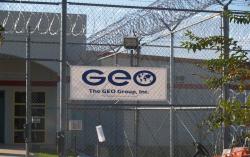This is CCR's weekly "Frontlines of Justice" news round-up, keeping you in the loop about what we've been up to and what's coming soon. Check it out every Monday, your one-stop-shop for CCR opinions, news coverage, reports from court appearances, upcoming events, and more!
Victory against private prisons!
In a victory in the fight against private prisons and for government transparency, the Supreme Court made a welcome decision to deny certiorari last week in our joint case with Detention Watch Network (DWN) against Immigration and Customs Enforcement, Department of Homeland Security, and the nation's two largest private prison contractors.
[caption align="right"] [/caption]
[/caption]We first filed the Freedom of Information Act (FOIA) litigation in November 2013 to dig up the internal workings of the detention bed quota, which incentivizes detention and profiteering by both public and private entities; we aimed to make the government divulge, among other things, the financial arrangements in their detention contracts with private companies and local governments, revealing how they have made immigrant detention a profiteering scheme.
In July 2016, a federal court ruled that the government could not withhold pricing information in contracts with private prison companies. The government chose not to appeal, but private prison corporations the GEO Group and CoreCivic (formerly Corrections Corporation of America) themselves stepped in to appeal independently. The Second Circuit dismissed their appeal for lack of standing—and GEO petitioned to the Supreme Court. The Court's conclusive rejection of their petition means that the original ruling of the Second Circuit Court of Appeals stands, upholding decades of precedent that private corporations can’t litigate on their own to undermine government transparency under the FOIA.
As our partners at DWN said in a press release, "With this decision, the Supreme Court has signaled agreement that private prison contractors must not act with impunity and dictate government secrecy. This victory is especially important as we face a presidential administration committed to mass privatization as well as mass detention and deportation."
At SCOTUS argument in Jesner v. Arab Bank, essential legal tool for corporate accountability for human rights abuses is at stake
[caption caption="In an ATS lawsuit against Shell for the company's complicity in human rights abuses against Nigeria's Ogoni people, including murder, CCR garnered an historic $15.5 settlement for the victims' families." align="left"] [/caption]
[/caption]Last Wednesday, the Supreme Court heard arguments in Jesner v. Arab Bank, ostensibly considering the question of whether the Alien Tort Statute (ATS), which allows non-U.S. citizens to assert a violation of the "law of nations" in a U.S. federal court, applies to corporations.
Since CCR revived the ATS in 1979 in the landmark case Filártiga v. Peña-Irala, it has become an essential tool in efforts to pursue—and win—accountability from corporations for human rights abuses (read more about this on our blog). As we argued in our amicus brief, there exists a clear consensus globally that corporations can be held liable for egregious violations, when under civil, criminal, or administrative law, and corporations are being held to account for violations—including when they occur far from the country where the company is headquartered—with greater frequency. We also stated in our brief that Jesner risks undermining the legacy of the ATS because it frames it as an anti-terror tool rather than a broad-based human rights tool. The Court’s ultimate ruling must make clear that the ATS is to be applied in a non-discriminatory manner, in line with fundamental human rights principles: it applies to all and for all. Any limitations on the scope of the ATS would betray the ATS promise of providing universal justice.
As CCR senior staff attorney Katherine Gallagher remarked to the National Law Journal after the arguments, "we are unlikely to end up in a situation where the court does not address corporate liability head-on," as happened in 2012 in the Kiobel case. And whether it looks to domestic or international law, there is ample support for the Court to find that along with rights, corporations have responsibilities—and can be held to account when they fail to respect human rights.
We'll have more analysis about the arguments to come—stay tuned!
This Wednesday: CCR joins #NoMuslimBanEver rally at the White House!
On October 18, Trump’s third iteration of the Muslim travel ban will go into effect, and CCR will be marching with hundreds outside the White House for the #NoMuslimBanEver national mobilization.
[caption align="right"] [/caption]
[/caption]As we wrote when it was announced, this ban is "yet another failed attempt to repackage a white supremacist policy that is unconstitutional and in violation of international law. And despite eliminating Iraq from the list, and adding two non-Muslim-majority countries that have negligible numbers of migrants to the U.S., it's patently obvious that the intent of this executive order remains to prevent Muslims from entering the U.S."
This is a vital moment to send an unequivocal message to this administration that Muslim communities are organized, with allies by their side, and will continue to resist racist and inhumane policies.
Visit the #NoMuslimBanEver website for more information about the rally and local events throughout the country, and join us in DC for the rally and march in front of the White House on Wednesday!
Join CCR for events in DC and NYC this week!
Creative storytelling has been a central part of CCR's work, and artists have been longtime allies in our efforts to shine a light on injustices happening at home and abroad. CCR staff are participating in a number of cultural events alongside artists and activists in NYC and DC this week, about Guantánamo, Palestine, and more – join us!
[caption align="left"] [/caption]
[/caption]In New York:
Tonight, Monday, 10/16: Symposium: What Does It Mean to Make Art at Guantánamo?; 6:00PM @ John Jay College
CCR advocacy program manager Aliya Hussain and fellow panelists will discuss the history and continued operation of Guantánamo and the meaning of art to the men imprisoned there.
Thursday, 10/19: The Siege: Performance & Post-Show Conversation; 7:30PM @ NYU Skirball Center
The Siege is a passionate retelling of the story of the 2002 siege of Bethlehem's Church of the Nativity, during the height of the second intifada. CCR deputy legal director Maria LaHood will participate in the post-show conversation.
Saturday, 10/21: The Siege: Performance & Post-Show Conversation; 7:30PM @ NYU Skirball Center
CCR Staff Attorney Diala Shamas will participate in a conversation, "Practice Resistance", following the performance.
In DC:
Thursday, 10/19: Welcome to Camp America: Book Talk & Signing; 6:30PM @ Busboys and Poets
CCR ally and collaborator Debi Cornwall has just released a new book, Welcome to Camp America: Inside Guantánamo Bay. The book is a vivid and disorienting glimpse into the U.S. Naval Station in Guantánamo Bay, Cuba, and its growing diaspora of released men, through photographs, declassified archival material, and first-person texts. Aliya Hussain will moderate a conversation with the author and others about Guantánamo and its contradictions.

